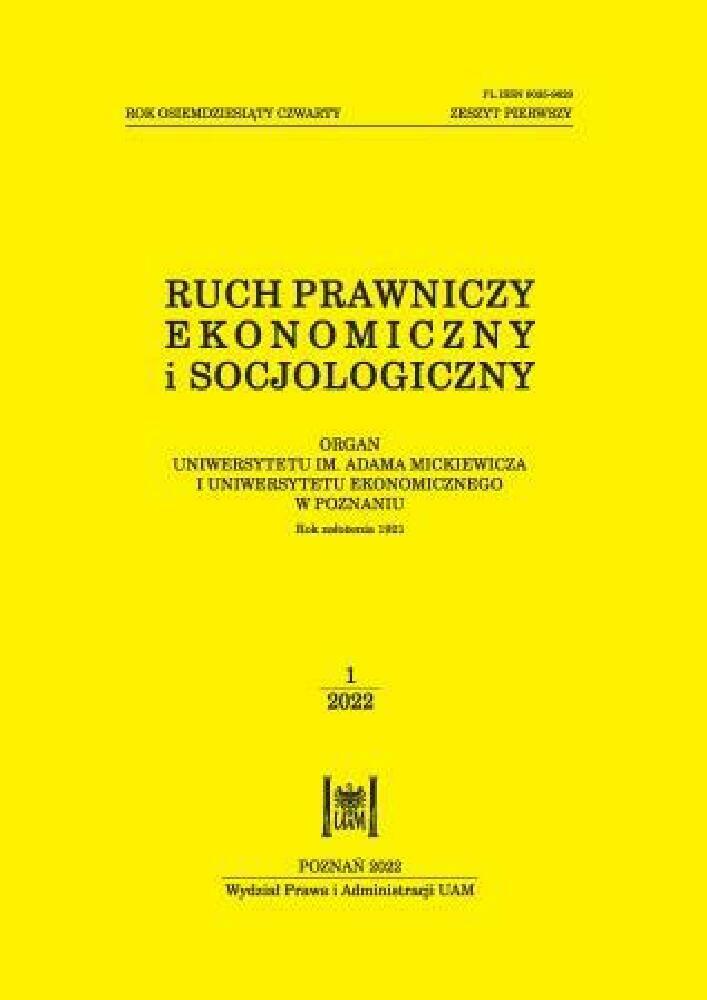Abstract
The aim of the article is to track the contemporary theoretical practices that serve to re-establish the ‘plant contract’ and to situate these threads within the field of critical plant studies. The genealogy of this subject area, which has developed rapidly over the last two decades, should be sought in the paradigm of feminist studies. In this approach, critical reflection revealing semiotic and material forms of oppression towards plants is accompanied by attempts to develop reparative practices. The author traces the historical forms of depreciation of plant beings, both in theory
and philosophy and in political, social and economic practices. Key to her decisions are: defining the specific plant ‘subjectivity’, recognizing the material agency of plants, incorporating the principle of vegetation into biopolitical considerations, as well as considering the intersectional entanglements of plants in the context of colonial botany and seed politics. The author points out that in each of the discussed cases, the specificity of feminist plant studies is based on the recognition of the ontological and political status of the plant, which results in attentiveness and care. This care is focused on the visibility and well-being of specific, material and embodied plant beings that are distant relatives of the human species.
References
Agamben, G. (2008). Homo sacer. Suwerenna władza i nagie życie. Tłum. M. Salwa. Warszawa.
Alaimo, S. (2010). Bodily Natures: Science, Environment, and the Material self. Bloomington.
Baluška, F., Gagliano, M., Witzany, G. (2018). Memory and Learning in Plants. Berlin–Heidelberg.
Baluška, F., Ninkovič, V. (2010). Plant Communication from an Ecological Perspective. Berlin–Heidelberg.
Bird Rose, D. (2013). Val Plumwood’s philosophical animism: attentive interactions in the sentient world. Environmental Humanities 3: 93–109.
Brockway, L.H. (2002). Science and Colonial Expansion: The Role of British Royal Botanic Gardens. New York.
Chamovitz, D. (2014). Zmysłowe życie roślin. Co wiedzą rośliny. Tłum. D. Wójtowicz. Warszawa.
Crosby, A.W. (1999). Imperializm ekologiczny: Biologiczna ekspansja Europy 900–1900. Tłum. M. Kowalczuk. Warszawa.
Delaporte, F. (1982). Nature’s Second Kingdom: Explorations of Vegetability in Eighteenth Century. Cambridge, MA.
Doyle, R. (2011). Darwin’s Pharmacy: Sex, Plants, and the Evolution of the Noosphere. Washington.
Fara, P. (2003). Sex, Botany & Empire: The Story of Carl Linnaeus and Joseph Banks. London.
Gibson, P., Sandilands, C. (2021). Introduction: plant performance. Performance Philosophy 6(2): 1–23.
Gibson, P. (2018). The Plant Contract: Art’s Return to Vegetal Life. Boston.
Gibson, S. (2015). Animal, Vegetable, Mineral? How Eighteenth-Century Science Disrupted the Natural Order. Oxford.
Hall, M. (2011). Plants as Persons: A Philosophical Botany. Albany–New York.
Hamilton, J.M., Neimanis, A. (2018). Composting feminisms and environmental humanities. Environmental Humanities 10: 501–27.
Haraway, D. (2012). Manifest gatunków stowarzyszonych, [w:] A. Gajewska (red.), Teorie wywrotowe. Antologia przekładów. Poznań: 241–260.
Haraway, D., Ishikawa, N., Gilbert, S.F., Olwig, K., Tsing, A.L., Bubandt, N. (2016). Anthropologists are talking – about the Anthropocene. Ethnos 81(3): 535–564.
Harvey, G. (2006). Animism: Respecting the Living World. New York.
Kallhoff, A. (2014) Plants in Ethics: Why Flourishing Deserves Moral Respect. Environmental Values 23: 685–700.
Kimmerer, R.W. (2013). Braiding Sweetgrass: Indigenous Wisdom, Scientific Knowledge and the Teachings of Plants. Minneapolis.
Kimmerer, R.W. (2020). Pieśń Ziemi. Rdzenna mądrość, wiedza naukowa i lekcje płynące z natury. Tłum. M. Bukowska. Kraków.
Kimmerer, R.W. (2003). Gathering Moss: A Natural and Cultural History of Mosses. Corvallis.
Karafyllis, N. (2018). ‘Hey plants. Take a walk on the wild side!’: The ethics of seeds and seed banks, [w:] A. Kallhoff, M. Di Paola, M. Schörgenhumer (eds.), Plant Ethics: Concepts and Applications. Abingdon–New York: 188–203.
Kohn, E. (2013). How Forests Think: Toward an Anthropology Beyond the Human. Berkeley.
Mancuso, S., Viola, A. (2013). Błyskotliwa zieleń. Wrażliwość i inteligencja roślin. Wrocław.
Marder, M. (2013a). Plant-thinking: A Philosophy of Vegetal Life. New York.
Marder, M. (2013b). What is plant-thinking? Klesis. Revue philosophique 25: 124–143.
Mathews, F. (2008). Vale Val: In Memory of Val Plumwood. Environmental Values 17.
Miller, E.P. (2002). The Vegetative Soul: From Philosophy of Nature to Subjectivity in the Feminine. Albany–New York.
Mintz, S.W. (1986). Sweetness and Power: The Place of Sugar in Modern History. New York.
Morton, A.G. (1981). History of Botanical Science: An Account of the Development of Botany from Ancient Times to the Present Day. London.
Nealon J.T. (2016). Plant Theory: Biopower and Vegetable Life. Stanford, CA.
Pollan, M. (2002). The Botany of Desire: A Plant’s-eye View of the World. New York.
Pouteau, S. (2018) Plants as open beings: from aesthetics to plant-human ethics, [w:] A. Kallhoff, M. Di Paola, M. Schörgenhumer (eds.), Plant Ethics: Concepts and Applications. Abingdon–New York: 82–97.
Rogowska-Stangret, M. (2019). Think we must! (Otherwise). Philosophy Today 63(4): 823–844.
Rogowska-Stangret, M. (2021). Być ze świata. Cztery eseje o etyce posthumanistycznej. Gdańsk.
Schiebinger, L. (2004). Plants and Empire: Colonial Bioprospecting in the Atlantic World. Cambridge.
Schiebinger, L., Swan, C. (eds.) (2005). Colonial Botany: Science, Commerce and Politics in the Early Modern World. Philadelphia.
Serres, M. (1995). The Natural Contract. Tłum. E. MacArthur, W. Paulson. Michigan.
Shiva, V. (1997). Biopiracy: The Plunder of Nature and Knowledge. Boston.
Shteir, A. (1996). Cultivating Women, Cultivating Science: Flora’s Daughters and Botany in England, 1760–1860. London.
Trewavas, A.J. (2015). Plant Behaviour and Intelligence. Oxford.
Wandersee, J.H., Schussler, E.E. (2001). Toward a theory of plant blindness. Plant Science Bulletin 47(1): 2–9.
Whittle, T. (1976). Łowcy roślin. Tłum. L. Hausbrandtowa. Warszawa.
Wieland, T. (2009). Autarky and Lebensraum: the political agenda of academic plant breeding in Nazi Germany. Journal of History of Science and Technology 3: 14–34.
Williams, M. (2020). Perspective. Plant awareness disparity: a case for renaming plant blindness. <https://plantae.org/perspective-plant-awareness-disparity-a-case-for-renaming-plant-blindness-plants-people-planet/> [dostęp: 14.02.2022].
Zamorska, M. (2020). Etyka roślin. Wiedza, troska i stawanie się z Innymi. Prace Kulturoznawcze 24: 43–62.
License
Copyright (c) 2022 WPiA UAM

This work is licensed under a Creative Commons Attribution-NonCommercial-NoDerivatives 4.0 International License.





